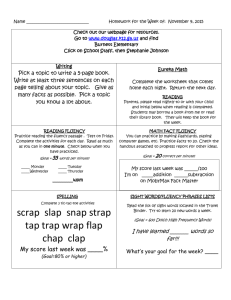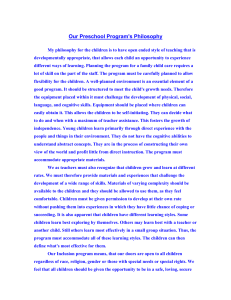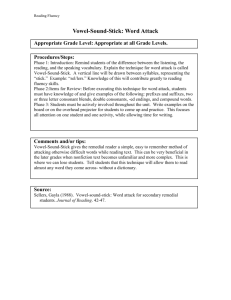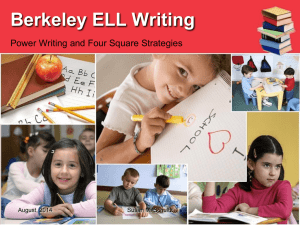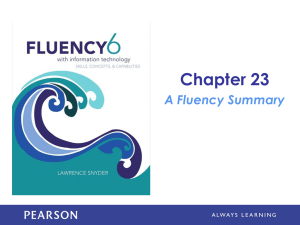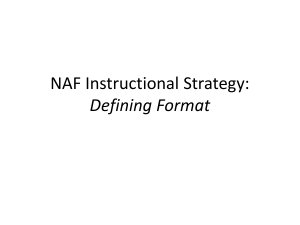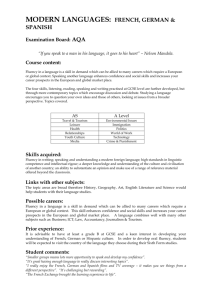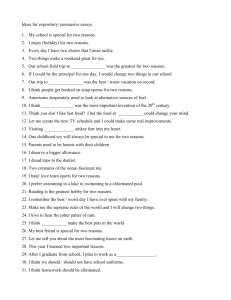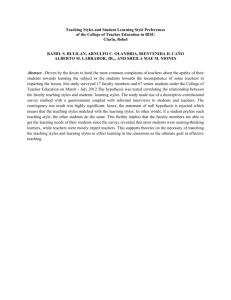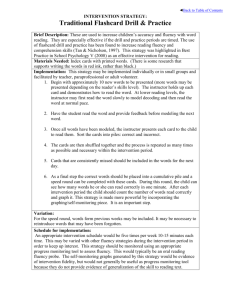4J Sample Interview Questions for Teachers
advertisement
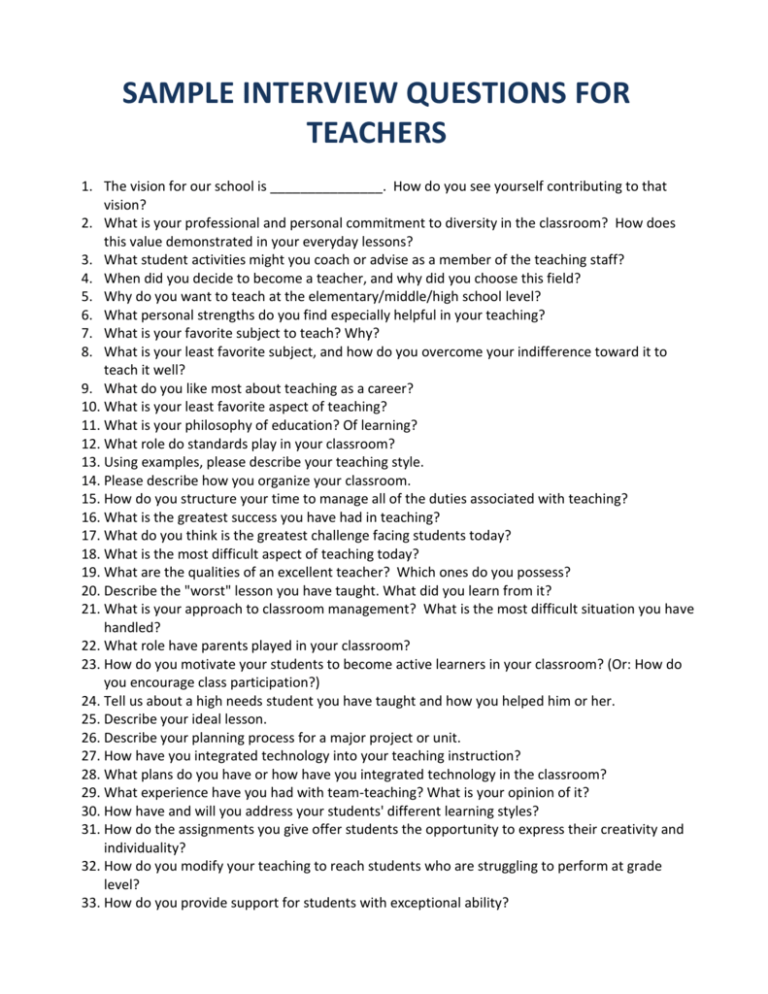
SAMPLE INTERVIEW QUESTIONS FOR TEACHERS 1. The vision for our school is _______________. How do you see yourself contributing to that vision? 2. What is your professional and personal commitment to diversity in the classroom? How does this value demonstrated in your everyday lessons? 3. What student activities might you coach or advise as a member of the teaching staff? 4. When did you decide to become a teacher, and why did you choose this field? 5. Why do you want to teach at the elementary/middle/high school level? 6. What personal strengths do you find especially helpful in your teaching? 7. What is your favorite subject to teach? Why? 8. What is your least favorite subject, and how do you overcome your indifference toward it to teach it well? 9. What do you like most about teaching as a career? 10. What is your least favorite aspect of teaching? 11. What is your philosophy of education? Of learning? 12. What role do standards play in your classroom? 13. Using examples, please describe your teaching style. 14. Please describe how you organize your classroom. 15. How do you structure your time to manage all of the duties associated with teaching? 16. What is the greatest success you have had in teaching? 17. What do you think is the greatest challenge facing students today? 18. What is the most difficult aspect of teaching today? 19. What are the qualities of an excellent teacher? Which ones do you possess? 20. Describe the "worst" lesson you have taught. What did you learn from it? 21. What is your approach to classroom management? What is the most difficult situation you have handled? 22. What role have parents played in your classroom? 23. How do you motivate your students to become active learners in your classroom? (Or: How do you encourage class participation?) 24. Tell us about a high needs student you have taught and how you helped him or her. 25. Describe your ideal lesson. 26. Describe your planning process for a major project or unit. 27. How have you integrated technology into your teaching instruction? 28. What plans do you have or how have you integrated technology in the classroom? 29. What experience have you had with team-teaching? What is your opinion of it? 30. How have and will you address your students' different learning styles? 31. How do the assignments you give offer students the opportunity to express their creativity and individuality? 32. How do you modify your teaching to reach students who are struggling to perform at grade level? 33. How do you provide support for students with exceptional ability? 34. How would you deal with a student who regularly missed school or your class? 35. If most of the students in your class failed an assignment, test, or project, how would you respond? 36. What would your students say they had learned after spending a year in your class? (Or: What do you want students to remember about your class?) 37. How would you establish and maintain good communication with the parents of your students? 38. What steps would you follow to deal with a student who displays consistent behavioral problems in your classroom? 39. Under what circumstances would you refer a student to the administrator's office? 40. What could a visitor to your class expect to see? 41. What do you hope to learn from your mentor? 42. How would you take advantage of resources within the community to enhance your teaching? 43. If your principal asked in a meeting for each teacher to come up with three ideas in their classroom to close the achievement gap for students of color, what would your three ideas be? 44. Please describe a lesson that you created that infused diversity or multiculturalism themes or topics. 45. A student comes to you to let you know that a friend called him a “chink.” How would you handle this situation? 46. How do you know if a student is learning? 47. A student tells you that she is having problems concentrating in class since she just had a bad breakup with her boyfriend and proceeds to tell you a lot of intimate details about their relationship. How would you handle this situation? 48. How do you feel language immersion is best taught? 49. Please describe your own work style. Which work styles of others do you feel are easy to work with? Which styles are you challenged by? 50. Describe what makes you a “Kid Magnet.” 51. How do you make learning fun? 52. Describe the steps you would take to meet the needs of a student on an IEP. 53. Describe the difference between a good teacher and a great teacher. Which are you? 54. Describe what steps you could take with a student with limited English proficiency to meet their needs? 55. What is a piece of feedback you have heard regarding your teaching from more than one source? What steps did you take to address it? 56. Describe your understanding and experience with Project-based learning. 57. Please share with us a lesson where you utilized differentiated instruction. 58. What are some ways to avoid behavior problems? 59. An extremely gifted student behaves in a way that challenges your authority and knowledge in front of the class. They tell you that they feel that they know more than you do. How might you handle this situation? 60. How closely do you follow your lesson plans? 61. What types of support would you need to have from the Principal to ensure you are successful as a new teacher in our building? 62. What kinds of students do you like to work with? What type of students do you teach most effectively? 63. What procedures do you use to evaluate student progress besides using tests? 64. What would your students say about you? Your colleagues? Your Principal? 65. What quality or qualities do you have that would enhance our teaching staff? 66. What do you feel is the most effective way to communicate with parents? 67. Describe any innovative or creative projects you have been involved in developing. 68. What rules do you have for your classroom? How do you communicate them to students? 69. Describe your teaching style and how you accommodate the different learning styles of students in your classes. 70. What are your strengths and how do you utilize it in your teaching? 71. Tell us about a recent best or cutting edge practice you have learned about and integrated into your lessons. 72. Describe the management strategies and techniques you use to maintain an effective classroom environment 73. In what ways do you keep students on task and well behaved during collaborative group activities? 74. Describe your expectations for student behavior? In other words, if I were to enter your class on an average day, what should I expect to see with regard to student behavior? 75. Tommy is your busy seventh-grader. He is constantly moving in your class and always ready to throw spitballs. Although his behavior is not seriously disruptive, it is annoying. He is especially active when he believes that you cannot see him. How would you deal with this situation? 76. Describe the management strategies and techniques you use to maintain an effective classroom environment 77. Describe your expectations for student behavior? In other words, if I were to enter your class on an average day, what should I expect to see with regard to student behavior? 78. What sorts of assessment, both formal and informal, do you view as being important indicators of successful performance for students learning your content area? 79. How do you adjust for reading level differences within your classroom? 80. Imagine that you are teaching a “regular” mainstream class in your content area. A new student arrives in your class one day, and you soon find out that this student possesses only limited English fluency (that is, some oral fluency but very limited reading and writing fluency). You realize that this is probably not the correct placement for the student, so you approach the counselor in charge of scheduling students. You are told that there is no room in the other classrooms for the foreseeable future and that you will just have to do the best you can. What would you do to accommodate this student until a better placement comes up? 81. In what ways, both formal and informal, might you assess a student with limited English fluency to be sure the student is truly learning the content of your course curriculum? 82. Why do you think the data shows that students from diverse cultural and educational backgrounds do not excel in school in comparison to more traditional students?
